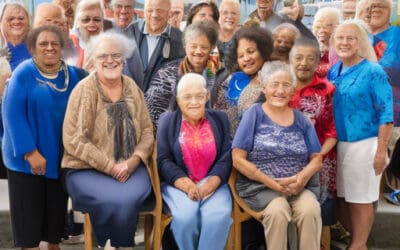Welcome to our comprehensive guide on touring assisted living communities. When it comes to finding the right assisted living community for yourself or your loved ones, it’s essential to have a checklist to ensure that you make an informed decision. In this article, we will walk you through a detailed checklist, providing you with valuable insights and expert advice every step of the way.
Your Checklist for Touring Assisted Living Communities
1. Location, Location, Location
Finding an assisted living community that is conveniently located is crucial. Consider factors such as proximity to family and friends, medical facilities, and amenities when evaluating the location. It’s essential to choose a community that offers a supportive and accessible environment.
2. Safety and Security
The safety and security of residents should be a top priority. Inquire about the security measures in place, such as surveillance systems, emergency response protocols, and staff training. A well-maintained and secure facility will give you peace of mind knowing that your loved ones are in good hands.
3. Accommodations and Amenities
Take a close look at the living accommodations and amenities provided by the assisted living community. Do they offer a variety of living options, such as private rooms or apartments? Are there common areas for socializing and recreational activities? Assess the quality and cleanliness of the facilities to ensure a comfortable living environment.
4. Staff Qualifications and Ratios
The staff at an assisted living community play a significant role in providing care and support to residents. Inquire about the qualifications and certifications of the staff members. Additionally, consider the staff-to-resident ratio to ensure that each resident receives adequate attention and personalized care.
5. Medical Care and Assistance
Understanding the level of medical care and assistance available is essential, especially if your loved one has specific health needs. Inquire about the presence of medical professionals, medication management protocols, and emergency response systems. It’s crucial to choose an assisted living community that can accommodate your loved one’s medical requirements.
6. Social and Recreational Activities
Engaging in social and recreational activities can significantly enhance the quality of life for assisted living residents. Look for communities that offer a diverse range of activities tailored to the interests and preferences of the residents. These activities can promote socialization, mental stimulation, and overall well-being.
7. Dining and Nutrition
Nutritious meals are an integral part of a healthy and enjoyable living experience. Inquire about the dining options available, including meal plans, menus, and dietary accommodations. A well-balanced and appetizing menu can contribute to the overall satisfaction and happiness of the residents.
8. Financial Considerations
Understanding the financial aspects of assisted living is crucial for effective planning. Inquire about the cost structure, including monthly fees, additional services, and any potential increases in the future. Ensure that you have a clear understanding of the financial commitments involved to make an informed decision.
9. Resident and Family Engagement
The involvement of residents and their families in decision-making and community activities is vital for a supportive and inclusive environment. Ask about opportunities for resident and family engagement, such as council meetings, family events, and feedback mechanisms. Open communication channels can foster a sense of belonging and community.
10. Visiting Policies and Flexibility
Consider the visiting policies of the assisted living community to ensure that it aligns with your preferences and lifestyle. Inquire about the flexibility of visitation hours, overnight stays, and the ability to accommodate guests. Being able to spend quality time with your loved ones in a welcoming environment is essential for maintaining strong relationships and a sense of connectedness.
11. Reviews and Reputation
Researching the reputation of an assisted living community is crucial before making a decision. Look for reviews and testimonials from current and past residents and their families. Online platforms and social media can provide valuable insights into the experiences of others. A community with positive feedback and a good reputation is likely to provide a high standard of care.
12. Specialized Care Services
If your loved one has specific care needs, it’s important to inquire about the availability of specialized care services. This can include memory care for individuals with dementia or Alzheimer’s, rehabilitation services, or assistance for individuals with mobility challenges. Ensure that the community has the resources and expertise to cater to your loved one’s unique requirements.
13. Transportation Services
Accessible transportation options can greatly enhance the independence and quality of life for residents. Inquire about the availability of transportation services for medical appointments, shopping trips, and social outings. Reliable and convenient transportation can make a significant difference in the overall experience of living in an assisted living community.
14. Pet-Friendly Policies
For many individuals, pets are an integral part of their lives and provide companionship and emotional support. If your loved one has a pet or is considering getting one, check the community’s pet policies. Ask about any restrictions, pet care services, and the availability of outdoor spaces for pets to enjoy. A pet-friendly environment can contribute to a sense of home and happiness.
15. Cultural and Religious Considerations
Cultural and religious preferences should be taken into account when selecting an assisted living community. Inquire about the community’s ability to accommodate specific cultural or religious practices, dietary restrictions, and the availability of spiritual support. Respecting and honoring an individual’s cultural and religious background can greatly contribute to their well-being and sense of belonging.
16. Emergency Preparedness
Inquire about the community’s emergency preparedness plans and protocols. Assess their readiness to handle potential emergencies such as natural disasters, power outages, or medical emergencies. Knowing that the community is well-equipped to handle unexpected situations will provide you with peace of mind.
17. Transparency and Documentation
Ensure that the assisted living community is transparent about its policies, contracts, and documentation. Review all agreements and contracts carefully, paying attention to details such as fees, services included, and termination policies. It’s important to have a clear understanding of all the terms and conditions before making a commitment.
18. Licensing and Accreditation
Check if the assisted living community is properly licensed and accredited. Licensing ensures that the community meets certain standards of care and safety. Accreditation from reputable organizations adds an extra layer of credibility and demonstrates the community’s commitment to excellence.
19. Ongoing Staff Training and Development
Inquire about the community’s commitment to ongoing staff training and development. A well-trained and knowledgeable staff is essential for providing high-quality care. Ask about the types of training programs and certifications staff members receive to ensure that they are up to date with the latest practices in senior care.
20. Transition and Adjustment Support
Moving to an assisted living community can be a significant life transition. Inquire about the community’s support services for residents during the adjustment period. This can include orientation programs, social support, and assistance with settling into the new living environment. A community that prioritizes the well-being and comfort of new residents can greatly facilitate a smooth transition.
Finding the right assisted living community requires careful consideration and research. By using this comprehensive checklist, you can ensure that you cover all the essential aspects when touring and evaluating different communities. Remember to prioritize your loved one’s comfort, safety, and well-being throughout the decision-making process. With thorough research and the right information, you can make an informed choice that provides the best possible living experience for your loved one.
Frequently Asked Questions (FAQs)
Q1: How do I find assisted living communities near me?
A1: To find assisted living communities near you, you can start by conducting an online search or using senior living directories. Websites such as A Place for Mom, SeniorAdvisor, or the National Center for Assisted Living provide comprehensive listings of assisted living communities in various locations. Additionally, you can seek recommendations from healthcare professionals, friends, or family members who have experience with assisted living communities.
Q2: What is the average cost of assisted living?
A2: The cost of assisted living can vary depending on factors such as location, amenities, level of care needed, and the size of the living accommodations. On average, the cost can range from $2,500 to $7,000 per month. It’s important to inquire about the specific pricing structure of each community you consider, as some may have additional fees for certain services or care levels.
Q3: How can I ensure the safety and well-being of my loved one in an assisted living community?
A3: Ensuring the safety and well-being of your loved one in an assisted living community starts with thorough research and due diligence. Look for communities with a strong reputation for safety and security measures. Visit the community in person to assess the overall cleanliness, observe the interactions between staff and residents, and ask specific questions about their safety protocols. Additionally, regularly communicate with your loved one and stay involved in their care to address any concerns promptly.
Q4: Can residents maintain their independence in assisted living communities?
A4: Yes, assisted living communities strive to promote independence among their residents. While there is assistance available for activities of daily living, such as bathing, dressing, and medication management, residents are encouraged to maintain their independence in other areas. Assisted living communities often offer a range of social and recreational activities, as well as opportunities for personal hobbies and interests, allowing residents to lead fulfilling and autonomous lives.
Q5: Can I visit the assisted living community before making a decision?
A5: Yes, it is highly recommended to visit the assisted living community before making a decision. By visiting in person, you can get a feel for the environment, meet the staff, interact with current residents, and observe the overall atmosphere. Take note of the cleanliness, friendliness of the staff, and the general happiness of the residents. It’s also an opportunity to ask questions and address any concerns you may have.
Q6: What should I do if my loved one’s needs change after moving into an assisted living community?
A6: It’s common for the needs of residents to change over time. If your loved one’s needs change, it’s important to communicate with the staff and management of the assisted living community. In many cases, the community will have additional care options or can make referrals to outside resources to ensure that your loved one receives the appropriate level of care. Open and ongoing communication is key to ensuring your loved one’s well-being.



